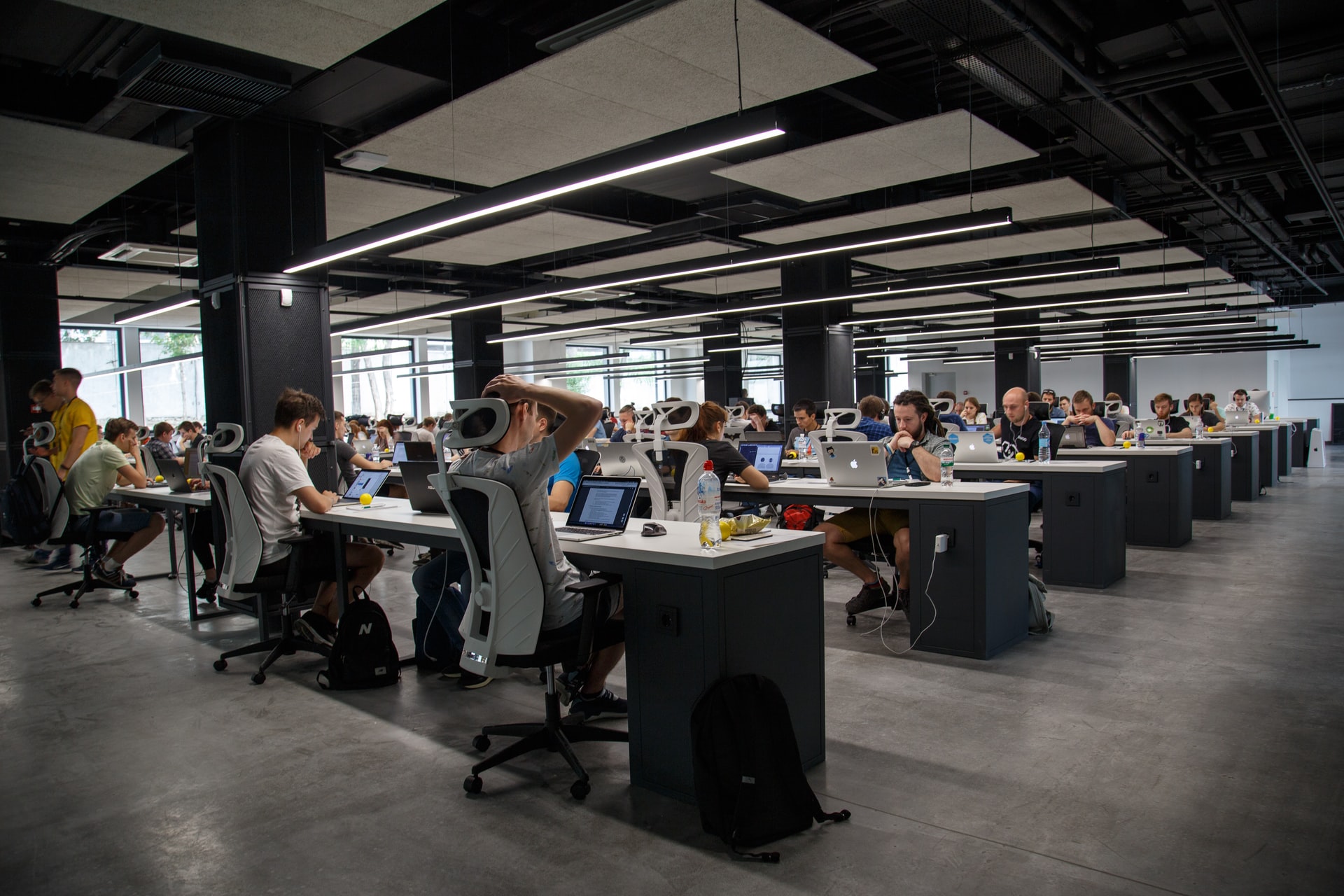Productivity ain’t what it used to be
You’re probably tired of hearing it, but we are in the middle of an important moment in human history.
It may seem strange to jump from that statement into a discussion about human productivity, but hear me out.
Most of us hear ‘productivity’ and think about how to get a few more items crossed off our daily to-do lists. Productivity seems more nuts-and-bolts than the big picture.
But at its heart, human productivity means whether or not we are doing a good job–a good job at being humans. If we aren’t productive, we aren’t doing the thing we are supposed to be doing. We aren’t producing value.
How we’ve defined that value has changed significantly over human history. Let’s look back and see how we’ve measured and defined as being productive in different eras.
Productivity over the eons
While humans were hunter-gatherers (for the first 90 percent or more of our existence), we relied on our ability to understand nature and adapt. Being productive meant finding enough food to survive and protecting the community from dangers.
Roughly 12,000 years ago, many human societies shifted to agriculture. Humans relied on our ability to do physical work, plan, and get more land. Productivity changed and was now measured by how much food we could cultivate in a given area.
About 250 years ago, the Industrial Revolution started. Humans relied on their ability to do repeated tasks which were hard for machines to do. Productivity turned into how many items we could manufacture in a given unit of time.
We entered the Information Age about 50 years ago, which was the first time we could depend solely on our cognitive abilities instead of our physical ones. However, we continued to define productivity-based units processed per time period.
Oh yeah, there’s that too
Then there’s the metric of productivity that hasn’t changed much in 12,000 years, which we don’t like to talk about: wealth (aka power, money, or land). The productivity metrics mentioned earlier still apply to human workers, but ultimately, we’ve always judged those with more wealth to be “doing a better job at life”. In some industrialized cultures, the poor are seen as “lazy”, or “unproductive”.
The robots are here for your productivity
Relatively soon, if not already, we will enter an Age of Automation. Machines, robots, and algorithms will take over common tasks of humans, things we’ve based our productivity on for a long time.
As that happens, we’ll need to rely on different abilities and create new metrics. Judging human productivity based on the number of units processed in a given amount of time will make everyone seem worthless. A human’s ability to memorize, process information, and make rational decisions will be about as useful as a pair of oxen on a modern farm.
…and maybe your money too
An Age of Automation not only means an end to human labor as we know it but something much broader.
Automation will generate an even greater amount of wealth, resulting in two possible outcomes. Either global wealth continues to concentrate in the hands of a few, or it gets distributed out to everyone else.
Money is a unit of scarcity. Automation can usher in a post-scarcity world where humans no longer need to work in exchange for money. They can still work at tasks and projects they feel important, but don’t have to choose a job just to support their livelihood.
This would completely change what human productivity means and how we define it.
Back to the present
This ebook tries to straddle both the futuristic and daily nature of productivity. The change from the old way of measuring productivity to the new won’t be easy or quick. Our current habits and standards were built for the past, not the future. Moving to a new model will feel strange, but it is essential if we are going to build the future we want.
Like other areas of work, we have to imagine where the future is going and build the road to get there. As you read this, we hope you are inspired to play your part in laying the groundwork.
The new human productivity
How do we define productivity in a world where machines are doing all the work we used to do?
Certain human abilities will become less useful as machines take over. But just like other major shifts in history, humans still have other skills they can rely on.
Skills like:
- creativity
- reflection
- strategy
- boldness
- compassion
- inquisitiveness
- innovation
These kinds of skills can survive through the Age of Automation.
If we also imagine a post-scarcity world where everyone’s needs are met and we aren’t choosing our work based on the money we make, that really opens up the possibilities for productivity.
If we believe that the core of productivity is doing a good job at being human, or producing real value, what are the ways we will judge productivity in the future?
Here are some ideas.
Boldly going where no one has gone before. Exploration will be a great task of the Age of Automation. With time to spare, we can gather more knowledge about the depths of the seas and the far corners of the universe. A productive day becomes one where we travel to a new place and gain knowledge.
Building less oppressive systems. If we build a greater understanding of our connection as humans, we can move beyond tribalism, racism, sexism, classism, and many other forms of oppression. There will be a lot to correct in our world, and a productive day becomes one where we do less harm to each other.
Finding greater sustainability. If the Age of Automation turns out to be great for humans, we will be motivated to make it last as long as possible. Unfortunately, our current never-ending race towards more wealth has led us to strip out all the resources in the world. So, productivity in the future would find ways to reverse those effects and keep things running smoothly.
Learning and skill building. For all the time we’ve been on the earth, there’s a lot we don’t understand. If aliens asked us, “Why do you guys dream at night?”, our best answer would be, “I dunno, we were too busy working to think about that.” Similarly, there’s a lot of skills that we’ve lost over the years because our time has gone to work (and making money). Productivity in the Age of Automation means we’ll actually have time to study and understand our world better.
Establishing new connections. Humans have always been good at finding new patterns and connections. In the future, a productive day is one where we meet someone new or build on the discoveries of others.
When you give humans access to what they need and as much time as they want, productivity takes on a whole new meaning. Doing a good job at being human will not mean how quickly we can do the same thing over and over in an hour, but will be much more grounded in these newly prioritized skills of humans.
Suddenly, spending a few hours in a coffee shop talking through new understanding of history becomes productive. Leading a group of kids on a trek to discover the start of a creek, or crafting that insightful comedy routine is extremely productive. Mastering an instrument or a language on the verge of extinction might be the most productive thing you can do.
Imagining what the future metrics of productivity might be can help us start to build that future now.
The modern barriers (and answers) to the new productivity
Let’s come back to the present for a while.
Over the last several hundred years, humans have relied more and more on cognitive functions to be productive at work. However, we haven’t done a good job at learning how to optimize our lives to be more productive at knowledge work. We still think that we can push our brains harder to get more out of them, just like we can do to machines.
Study after study shows that our brains work best when they are not stressed, well-rested, and able to focus on the task at hand. But it is still countercultural to arrange our lives and workplaces around promoting these things.
Four things we are horrible at
When it comes to productivity with knowledge work, there are four things that our present society is really, really bad at:
- Remembering all the things we need to do
- Actually doing the most important things
- Creating time for doing important work
- Staying focused despite distractions around us
If productivity in the future will be based on even more specialized cognitive functioning, we need to start learning how to be more productive with our brains now.
Task management
David Allen says, “Your mind is for having ideas, not holding them.” To achieve great productivity, humans need a way to collect and organize the tasks they want to accomplish to achieve a bigger goal. We have ideas all the time, but if we do not capture them, we cannot consider ourselves very productive.
Prioritization
One of the reasons for low productivity among knowledge workers is not that they aren’t working, but they aren’t doing the right things. Humans are innately good at prioritizing tasks when they are forced to sit down and rank them, but we do it very sparingly. Productivity in the 21st century will be dependent on our ability to figure out what tasks are better delegated to machines, and what is the best use of our time.
Time/energy management
Our modern work schedules have taken our days and split them up into small blocks of time here and there. We don’t have a lot of long dedicated chunks to focus on deep work where we really get important things done. The hours in our work day seem to belong to other people, and even when we get the chance to schedule it, we often don’t do it wisely.
The most productive work in the future cannot be done in bits and pieces, but needs large swaths of uninterrupted time. Reducing the amount of time we are required to work can help with that, but there’s still a lot to learn. We have yet to build effective systems that reward people who take time to rest and recharge.
Paying attention to the energy we have at different times of the day is one of those under-researched areas which can also yield a lot of new productivity.
Focus
One evolutionary holdover from our hunter-gatherer days that won’t help us in the future is our tendency to focus on the urgent and be distracted by potential threats. We need to start with removing all the harmful external distractions that we’ve recently introduced into our lives in the form of notifications, instant messages, and pings.
However, even if we remove these things, we often create our own internal distractions. Teaching humans how to focus and pursue a state of flow will become very important to be highly productive in the future.
Optimizing humans for productivity
Imagine being an advanced alien species (or an AI bot) that discovers humans and wants to contract some of them to do work–using those core human skills that will be most valuable in the 21st century.
What would they do to get the most out of their investment?
I imagine they would make sure that their humans had:
- Plenty of sleep and rest
- Adequate time for leisure activities
- Minimal levels of bad stress and anxiety
- Minimal distractions when performing core work
- Prodding to continuously evaluate the importance of their tasks
- Long blocks of time to do work when energy levels are highest
If the machines would do it, why don’t we?
Building a futuristic productive team culture, today
It’s time to focus on what we can do today that will help us get to a more idealized future when it comes to human productivity.
The Age of Automation is not a maybe thing. Many tasks humans have been doing for centuries or more are quickly shifting to machines, and it’s not going to stop or slow down.
Therefore, as a leader in the workforce, you have the option to either squeeze as much old-style productivity as you can out of the people around you, or become an early adopter and acceptor of the new productivity.
Here are several practical things you can do to start.
Banish the idea that more time in office equals more work
We need to break the strong connection between work and time. It’s still deeply ingrained in our minds that human workers should be paid per hour or that their pay is tied to sitting at a desk (thinking about remote team productivity) for a particular number of hours a day.
This should strike us as ridiculous.
In addition to commoditizing time (the only truly limited resource we have), it says that to do more work, you need to put in more time. It’s rare to hear someone way, “Gosh I have some really important things to do this week. I better make sure to get some extra sleep and work out regularly.” Instead, we default to cutting corners in our health and personal lives.
As a leader, you must make sure your teams know what you really value as productive work, and that you don’t value them just being present.
Remove stress and anxiety
One of the greatest threats that damages our health and productivity is stress. When our work lives are stressful, it seeps over to our personal lives and health.
Work shouldn’t be a place where you come to get stressed. It should be a place where you come to be creative, explore, and make a difference.
When was the last time that stress was actually positively productive at your office? Did you work late nights to release a new feature? Was it really worth all the stress looking back on it?
Business leaders of the next era of productivity will find ways to remove as much stress as possible from their human workers. What can you do now?
Pay a comfortable wage
One of the most practical ways to reduce the stress of your team is to make sure they have enough money to live with some margin. If there are people on your team that struggle to make ends meet and work second or third jobs on the side out of necessity, you are not getting the best out of them.
We’ve already mentioned the possibility of decoupling work and money. While we aren’t ready to move there entirely, that doesn’t mean we can’t take some small steps to get there. Having a set “minimum basic income” for people working at your company allows them to not live in fear.
Reward with more time off rather than more money
Speaking of money, instead of only using salary hikes as a reward for yearly appraisals, why not offer more time off in lieu of higher pay? One common complaint of workers is that they must either work a 40+ hour work week, or not at all. There isn’t much in between. Holding workers’ salaries steady while asking them to come into the office less is a great way to show them that you want only their best work at the office.
Protect your team from distractions
We are currently in the middle of a tsunami of software vying for everyone’s attention. Many of those tools are engineered to get your team to spend as much time as possible in them. While you need to offer your team the proper tools to get their work done, one of your main considerations should be how often the tool distracts them.
To maximize productivity, modern workers will need long blocks of time to focus on their work without distractions. Yet, there are very few companies in the world that offer this. Most tacitly expect everyone to be on call, ready to be interrupted at any moment.
Establish a culture of focus and choose tools that are not invasive.
Promote and model the importance of rest and disconnecting
As much as you tell your team to take time off and get plenty of rest, if the leadership isn’t doing it, it won’t happen. If the boss never takes a vacation, it makes it feel like it’s not ok. Leadership needs to model taking breaks, vacations, family leave, getting good sleep, and not responding to messages after hours.
Offering financial benefits like money to spend on vacations, learning a new skill, sabbaticals, and monthly fitness goals are just the start of establishing a new culture of productivity.
Celebrate new metrics, not old ones
It’s common to hear leaders praise people who get to the office early, leave late, are always available, and put in lots of extra effort. But rarely do we hear praise for the woman who devised, wrote, and automated a successful marketing campaign by noon and then left for the day to volunteer at a conservation project.
Embrace automation
Automation is often promoted as a job killer. Some see it as a way to reduce the bottom line and get rid of human workers.
However, we actually need to invest more into automation. The work that automated systems are capable of is the stuff that humans shouldn’t be getting good at anymore. When you bring automation into your company, you increase your organization’s ability to produce, and create more margin for humans to work on other things.
We aren’t going to solve the productivity challenge by running away from technology, but by learning how to work with it.
Expand who gets these new rewards
Creating a modern productive culture might sound like a great idea, but if we ignore the existing systems that are biased towards those who already have privilege, then we create a further divide between the haves and have nots.
Offering a well-paying job with plenty of margin and time off to someone who looks like you may mean that this person has more time to research and write books about Viking history. Offering it to a single mother might mean changing the course of an entire generation.
Rethink your growth strategy
David Heinemeier Hansson of Basecamp says that the biggest cause of all the negative parts of contemporary tech culture goes back to “unrealistic, outsized ambition”. When growth is the main thing on your mind, every decision gets filtered through it, no matter what those posters on the wall say about how awesome your culture is.
Instead of infinite growth, what if your company found a sustainable level to stay at? If you actually set a growth target you can reach instead of just “getting bigger”, then you have time to focus on other goals that are actually more important.
Next-level productivity
The way we’ve defined “doing a good job at work” has changed significantly over the history of humanity. Humans have relied on different skills and abilities to get that work done.
As we stand on the edge of the Age of Automation, we have a choice. If we drag the old rules of productivity into the future, we’ll end up in a world where humans are truly irrelevant because we won’t be able to compete against machines and systems that will be able to do all the things we used to do.
However, if we decide to change the metrics of productivity, we can focus on the unique skills we still have and optimize our work life for them.
It won’t be a fast change, but it will never happen unless we start to make small and big changes in our companies right now. How can you do your part to bring about a better world of productivity for humanity?
Productivity ain’t what it used to be
You’re probably tired of hearing it, but we are in the middle of an important moment in human history.
It may seem strange to jump from that statement into a discussion about human productivity, but hear me out.
Most of us hear ‘productivity’ and think about how to get a few more items crossed off our daily to-do lists. Productivity seems more nuts-and-bolts than the big picture.
But at its heart, human productivity means whether or not we are doing a good job–a good job at being humans. If we aren’t productive, we aren’t doing the thing we are supposed to be doing. We aren’t producing value.
How we’ve defined that value has changed significantly over human history. Let’s look back and see how we’ve measured and defined as being productive in different eras.
Productivity over the eons
While humans were hunter-gatherers (for the first 90 percent or more of our existence), we relied on our ability to understand nature and adapt. Being productive meant finding enough food to survive and protecting the community from dangers.
Roughly 12,000 years ago, many human societies shifted to agriculture. Humans relied on our ability to do physical work, plan, and get more land. Productivity changed and was now measured by how much food we could cultivate in a given area.
About 250 years ago, the Industrial Revolution started. Humans relied on their ability to do repeated tasks which were hard for machines to do. Productivity turned into how many items we could manufacture in a given unit of time.
We entered the Information Age about 50 years ago, which was the first time we could depend solely on our cognitive abilities instead of our physical ones. However, we continued to define productivity-based units processed per time period.
Oh yeah, there’s that too
Then there’s the metric of productivity that hasn’t changed much in 12,000 years, which we don’t like to talk about: wealth (aka power, money, or land). The productivity metrics mentioned earlier still apply to human workers, but ultimately, we’ve always judged those with more wealth to be “doing a better job at life”. In some industrialized cultures, the poor are seen as “lazy”, or “unproductive”.
The robots are here for your productivity
Relatively soon, if not already, we will enter an Age of Automation. Machines, robots, and algorithms will take over common tasks of humans, things we’ve based our productivity on for a long time.
As that happens, we’ll need to rely on different abilities and create new metrics. Judging human productivity based on the number of units processed in a given amount of time will make everyone seem worthless. A human’s ability to memorize, process information, and make rational decisions will be about as useful as a pair of oxen on a modern farm.
…and maybe your money too
An Age of Automation not only means an end to human labor as we know it but something much broader.
Automation will generate an even greater amount of wealth, resulting in two possible outcomes. Either global wealth continues to concentrate in the hands of a few, or it gets distributed out to everyone else.
Money is a unit of scarcity. Automation can usher in a post-scarcity world where humans no longer need to work in exchange for money. They can still work at tasks and projects they feel important, but don’t have to choose a job just to support their livelihood.
This would completely change what human productivity means and how we define it.
Back to the present
This ebook tries to straddle both the futuristic and daily nature of productivity. The change from the old way of measuring productivity to the new won’t be easy or quick. Our current habits and standards were built for the past, not the future. Moving to a new model will feel strange, but it is essential if we are going to build the future we want.
Like other areas of work, we have to imagine where the future is going and build the road to get there. As you read this, we hope you are inspired to play your part in laying the groundwork.
The new human productivity
How do we define productivity in a world where machines are doing all the work we used to do?
Certain human abilities will become less useful as machines take over. But just like other major shifts in history, humans still have other skills they can rely on.
Skills like:
- creativity
- reflection
- strategy
- boldness
- compassion
- inquisitiveness
- innovation
These kinds of skills can survive through the Age of Automation.
If we also imagine a post-scarcity world where everyone’s needs are met and we aren’t choosing our work based on the money we make, that really opens up the possibilities for productivity.
If we believe that the core of productivity is doing a good job at being human, or producing real value, what are the ways we will judge productivity in the future?
Here are some ideas.
Boldly going where no one has gone before. Exploration will be a great task of the Age of Automation. With time to spare, we can gather more knowledge about the depths of the seas and the far corners of the universe. A productive day becomes one where we travel to a new place and gain knowledge.
Building less oppressive systems. If we build a greater understanding of our connection as humans, we can move beyond tribalism, racism, sexism, classism, and many other forms of oppression. There will be a lot to correct in our world, and a productive day becomes one where we do less harm to each other.
Finding greater sustainability. If the Age of Automation turns out to be great for humans, we will be motivated to make it last as long as possible. Unfortunately, our current never-ending race towards more wealth has led us to strip out all the resources in the world. So, productivity in the future would find ways to reverse those effects and keep things running smoothly.
Learning and skill building. For all the time we’ve been on the earth, there’s a lot we don’t understand. If aliens asked us, “Why do you guys dream at night?”, our best answer would be, “I dunno, we were too busy working to think about that.” Similarly, there’s a lot of skills that we’ve lost over the years because our time has gone to work (and making money). Productivity in the Age of Automation means we’ll actually have time to study and understand our world better.
Establishing new connections. Humans have always been good at finding new patterns and connections. In the future, a productive day is one where we meet someone new or build on the discoveries of others.
When you give humans access to what they need and as much time as they want, productivity takes on a whole new meaning. Doing a good job at being human will not mean how quickly we can do the same thing over and over in an hour, but will be much more grounded in these newly prioritized skills of humans.
Suddenly, spending a few hours in a coffee shop talking through new understanding of history becomes productive. Leading a group of kids on a trek to discover the start of a creek, or crafting that insightful comedy routine is extremely productive. Mastering an instrument or a language on the verge of extinction might be the most productive thing you can do.
Imagining what the future metrics of productivity might be can help us start to build that future now.
The modern barriers (and answers) to the new productivity
Let’s come back to the present for a while.
Over the last several hundred years, humans have relied more and more on cognitive functions to be productive at work. However, we haven’t done a good job at learning how to optimize our lives to be more productive at knowledge work. We still think that we can push our brains harder to get more out of them, just like we can do to machines.
Study after study shows that our brains work best when they are not stressed, well-rested, and able to focus on the task at hand. But it is still countercultural to arrange our lives and workplaces around promoting these things.
Four things we are horrible at
When it comes to productivity with knowledge work, there are four things that our present society is really, really bad at:
- Remembering all the things we need to do
- Actually doing the most important things
- Creating time for doing important work
- Staying focused despite distractions around us
If productivity in the future will be based on even more specialized cognitive functioning, we need to start learning how to be more productive with our brains now.
Task management
David Allen says, “Your mind is for having ideas, not holding them.” To achieve great productivity, humans need a way to collect and organize the tasks they want to accomplish to achieve a bigger goal. We have ideas all the time, but if we do not capture them, we cannot consider ourselves very productive.
Prioritization
One of the reasons for low productivity among knowledge workers is not that they aren’t working, but they aren’t doing the right things. Humans are innately good at prioritizing tasks when they are forced to sit down and rank them, but we do it very sparingly. Productivity in the 21st century will be dependent on our ability to figure out what tasks are better delegated to machines, and what is the best use of our time.
Time/energy management
Our modern work schedules have taken our days and split them up into small blocks of time here and there. We don’t have a lot of long dedicated chunks to focus on deep work where we really get important things done. The hours in our work day seem to belong to other people, and even when we get the chance to schedule it, we often don’t do it wisely.
The most productive work in the future cannot be done in bits and pieces, but needs large swaths of uninterrupted time. Reducing the amount of time we are required to work can help with that, but there’s still a lot to learn. We have yet to build effective systems that reward people who take time to rest and recharge.
Paying attention to the energy we have at different times of the day is one of those under-researched areas which can also yield a lot of new productivity.
Focus
One evolutionary holdover from our hunter-gatherer days that won’t help us in the future is our tendency to focus on the urgent and be distracted by potential threats. We need to start with removing all the harmful external distractions that we’ve recently introduced into our lives in the form of notifications, instant messages, and pings.
However, even if we remove these things, we often create our own internal distractions. Teaching humans how to focus and pursue a state of flow will become very important to be highly productive in the future.
Optimizing humans for productivity
Imagine being an advanced alien species (or an AI bot) that discovers humans and wants to contract some of them to do work–using those core human skills that will be most valuable in the 21st century.
What would they do to get the most out of their investment?
I imagine they would make sure that their humans had:
- Plenty of sleep and rest
- Adequate time for leisure activities
- Minimal levels of bad stress and anxiety
- Minimal distractions when performing core work
- Prodding to continuously evaluate the importance of their tasks
- Long blocks of time to do work when energy levels are highest
If the machines would do it, why don’t we?
Building a futuristic productive team culture, today
It’s time to focus on what we can do today that will help us get to a more idealized future when it comes to human productivity.
The Age of Automation is not a maybe thing. Many tasks humans have been doing for centuries or more are quickly shifting to machines, and it’s not going to stop or slow down.
Therefore, as a leader in the workforce, you have the option to either squeeze as much old-style productivity as you can out of the people around you, or become an early adopter and acceptor of the new productivity.
Here are several practical things you can do to start.
Banish the idea that more time in office equals more work
We need to break the strong connection between work and time. It’s still deeply ingrained in our minds that human workers should be paid per hour or that their pay is tied to sitting at a desk (thinking about remote team productivity) for a particular number of hours a day.
This should strike us as ridiculous.
In addition to commoditizing time (the only truly limited resource we have), it says that to do more work, you need to put in more time. It’s rare to hear someone way, “Gosh I have some really important things to do this week. I better make sure to get some extra sleep and work out regularly.” Instead, we default to cutting corners in our health and personal lives.
As a leader, you must make sure your teams know what you really value as productive work, and that you don’t value them just being present.
Remove stress and anxiety
One of the greatest threats that damages our health and productivity is stress. When our work lives are stressful, it seeps over to our personal lives and health.
Work shouldn’t be a place where you come to get stressed. It should be a place where you come to be creative, explore, and make a difference.
When was the last time that stress was actually positively productive at your office? Did you work late nights to release a new feature? Was it really worth all the stress looking back on it?
Business leaders of the next era of productivity will find ways to remove as much stress as possible from their human workers. What can you do now?
Pay a comfortable wage
One of the most practical ways to reduce the stress of your team is to make sure they have enough money to live with some margin. If there are people on your team that struggle to make ends meet and work second or third jobs on the side out of necessity, you are not getting the best out of them.
We’ve already mentioned the possibility of decoupling work and money. While we aren’t ready to move there entirely, that doesn’t mean we can’t take some small steps to get there. Having a set “minimum basic income” for people working at your company allows them to not live in fear.
Reward with more time off rather than more money
Speaking of money, instead of only using salary hikes as a reward for yearly appraisals, why not offer more time off in lieu of higher pay? One common complaint of workers is that they must either work a 40+ hour work week, or not at all. There isn’t much in between. Holding workers’ salaries steady while asking them to come into the office less is a great way to show them that you want only their best work at the office.
Protect your team from distractions
We are currently in the middle of a tsunami of software vying for everyone’s attention. Many of those tools are engineered to get your team to spend as much time as possible in them. While you need to offer your team the proper tools to get their work done, one of your main considerations should be how often the tool distracts them.
To maximize productivity, modern workers will need long blocks of time to focus on their work without distractions. Yet, there are very few companies in the world that offer this. Most tacitly expect everyone to be on call, ready to be interrupted at any moment.
Establish a culture of focus and choose tools that are not invasive.
Promote and model the importance of rest and disconnecting
As much as you tell your team to take time off and get plenty of rest, if the leadership isn’t doing it, it won’t happen. If the boss never takes a vacation, it makes it feel like it’s not ok. Leadership needs to model taking breaks, vacations, family leave, getting good sleep, and not responding to messages after hours.
Offering financial benefits like money to spend on vacations, learning a new skill, sabbaticals, and monthly fitness goals are just the start of establishing a new culture of productivity.
Celebrate new metrics, not old ones
It’s common to hear leaders praise people who get to the office early, leave late, are always available, and put in lots of extra effort. But rarely do we hear praise for the woman who devised, wrote, and automated a successful marketing campaign by noon and then left for the day to volunteer at a conservation project.
Embrace automation
Automation is often promoted as a job killer. Some see it as a way to reduce the bottom line and get rid of human workers.
However, we actually need to invest more into automation. The work that automated systems are capable of is the stuff that humans shouldn’t be getting good at anymore. When you bring automation into your company, you increase your organization’s ability to produce, and create more margin for humans to work on other things.
We aren’t going to solve the productivity challenge by running away from technology, but by learning how to work with it.
Expand who gets these new rewards
Creating a modern productive culture might sound like a great idea, but if we ignore the existing systems that are biased towards those who already have privilege, then we create a further divide between the haves and have nots.
Offering a well-paying job with plenty of margin and time off to someone who looks like you may mean that this person has more time to research and write books about Viking history. Offering it to a single mother might mean changing the course of an entire generation.
Rethink your growth strategy
David Heinemeier Hansson of Basecamp says that the biggest cause of all the negative parts of contemporary tech culture goes back to “unrealistic, outsized ambition”. When growth is the main thing on your mind, every decision gets filtered through it, no matter what those posters on the wall say about how awesome your culture is.
Instead of infinite growth, what if your company found a sustainable level to stay at? If you actually set a growth target you can reach instead of just “getting bigger”, then you have time to focus on other goals that are actually more important.
Next-level productivity
The way we’ve defined “doing a good job at work” has changed significantly over the history of humanity. Humans have relied on different skills and abilities to get that work done.
As we stand on the edge of the Age of Automation, we have a choice. If we drag the old rules of productivity into the future, we’ll end up in a world where humans are truly irrelevant because we won’t be able to compete against machines and systems that will be able to do all the things we used to do.
However, if we decide to change the metrics of productivity, we can focus on the unique skills we still have and optimize our work life for them.
It won’t be a fast change, but it will never happen unless we start to make small and big changes in our companies right now. How can you do your part to bring about a better world of productivity for humanity?
)
)
)







